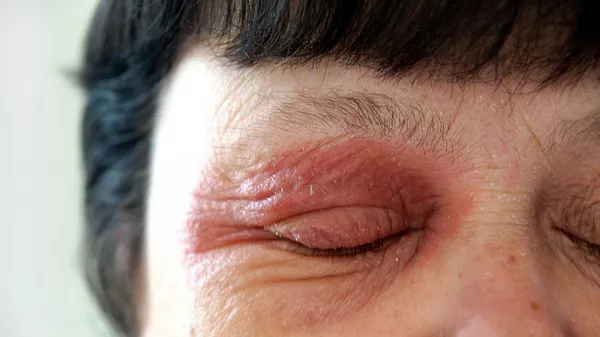Swollen eyes from eczema, medically known as atopic dermatitis, can be both painful and distressing. Eczema is a chronic skin condition characterized by inflammation, itchiness, and redness. When it affects the delicate skin around the eyes, it can lead to significant discomfort and visual impairment. Understanding how to treat and manage this condition is crucial for improving quality of life and preventing complications. This article will provide a comprehensive guide on how to treat swollen eyes caused by eczema, including medical treatments, home remedies, lifestyle changes, and preventive measures.
Understanding Eczema and Its Impact on the Eyes
Eczema is a condition that affects millions of people worldwide. It can occur at any age but is most common in children. The exact cause of eczema is not fully understood, but it is believed to be a combination of genetic and environmental factors. When eczema affects the eye area, it can cause swelling, redness, itchiness, and even changes in skin texture. The skin around the eyes is particularly sensitive and prone to irritation, making it more susceptible to the effects of eczema.
Medical Treatments for Swollen Eyes Due to Eczema
When dealing with swollen eyes caused by eczema, medical treatments can offer significant relief. It is essential to consult a healthcare professional to determine the best course of action. Some common medical treatments include:
Topical Corticosteroids
- Usage: Topical corticosteroids are anti-inflammatory medications applied directly to the skin. They help reduce swelling, redness, and itching.
- Application: It is important to use these under the guidance of a healthcare provider to avoid potential side effects such as skin thinning.
Calcineurin Inhibitors
- Usage: These are non-steroidal medications that help reduce inflammation and immune responses.
- Examples: Tacrolimus and pimecrolimus are commonly prescribed for sensitive areas like the face and around the eyes.
- Benefits: They have fewer side effects compared to corticosteroids and are suitable for long-term use.
Antihistamines
- Usage: Oral antihistamines can help reduce itching and prevent the urge to rub the eyes, which can exacerbate swelling.
- Examples: Diphenhydramine and cetirizine are commonly used.
Antibiotics
- Usage: If there is a secondary bacterial infection, antibiotics may be necessary.
- Forms: These can be topical or oral, depending on the severity of the infection.
Immunosuppressants
- Usage: In severe cases of eczema, systemic immunosuppressants such as cyclosporine or methotrexate may be prescribed.
- Monitoring: These medications require careful monitoring due to potential side effects.
Home Remedies and Natural Treatments
In addition to medical treatments, several home remedies can help manage symptoms and provide relief from swollen eyes caused by eczema. These remedies are often easy to implement and can be used alongside medical treatments.
Cold Compresses
- Method: Applying a cold compress to the affected area can help reduce swelling and soothe itching.
- Procedure: Use a clean cloth soaked in cold water and place it over the eyes for 10-15 minutes.
Cucumber Slices
- Benefits: Cucumber has natural anti-inflammatory properties and can help reduce swelling.
- Application: Place chilled cucumber slices over the eyes for 10-15 minutes.
Aloe Vera
- Properties: Aloe vera has soothing and anti-inflammatory properties that can help reduce eczema symptoms.
- Application: Apply pure aloe vera gel around the eyes, being careful to avoid getting it in the eyes.
Chamomile Tea Bags
- Method: Chamomile has anti-inflammatory and calming properties.
- Procedure: Steep chamomile tea bags in hot water, let them cool, and place them over the eyes for 10-15 minutes.
Coconut Oil
- Benefits: Coconut oil can moisturize the skin and has anti-inflammatory properties.
- Application: Gently apply a small amount of coconut oil around the eyes.
Lifestyle Changes to Manage and Prevent Swollen Eyes
Long-term management and prevention of swollen eyes due to eczema require lifestyle changes. These changes can help reduce flare-ups and improve overall skin health.
Identify and Avoid Triggers
- Common Triggers: Triggers can include allergens, stress, certain foods, and environmental factors.
- Action: Keeping a diary of flare-ups and potential triggers can help identify and avoid them.
SEE ALSO: How to Treat Contact Dermatitis Blisters
Maintain a Healthy Diet
- Diet: A balanced diet rich in anti-inflammatory foods can help manage eczema.
- Foods to Include: Omega-3 fatty acids, fruits, vegetables, and whole grains.
Proper Skin Care Routine
- Cleansing: Use gentle, fragrance-free cleansers.
- Moisturizing: Regularly apply hypoallergenic moisturizers to keep the skin hydrated.Stress Management
- Techniques: Practices such as yoga, meditation, and deep breathing can help manage stress, which can trigger eczema flare-ups.
Regular Exercise
- Benefits: Exercise can improve overall health and reduce stress.
- Precautions: Choose activities that do not cause excessive sweating or friction.
Preventive Measures
Prevention is a key aspect of managing eczema, especially around the sensitive eye area. Implementing preventive measures can significantly reduce the frequency and severity of flare-ups.
Use of Protective Eyewear
- Purpose: Protecting the eyes from environmental irritants such as pollen, dust, and harsh weather conditions.
- Types: Sunglasses or goggles can be beneficial.
Humidifiers
- Benefits: Using a humidifier can add moisture to the air, preventing dry skin that can trigger eczema.
- Usage: Especially useful during dry winter months.
Hypoallergenic Products
- Selection: Choose hypoallergenic makeup, skincare, and hair care products.
- Avoid: Fragrances and harsh chemicals that can irritate the skin.
Regular Hand Washing
- Importance: Keeping hands clean can prevent the transfer of irritants and bacteria to the eye area.
- Method: Use gentle soaps and avoid hot water.
Avoid Rubbing the Eyes
- Reason: Rubbing can cause further irritation and damage to the sensitive skin around the eyes.
- Tip: Gently pat the eyes if necessary and use soft tissues or cloths.
When to Seek Medical Attention
While many cases of swollen eyes due to eczema can be managed at home, it is crucial to know when to seek medical attention. Consult a healthcare professional if you experience:
- Severe pain or discomfort
- Signs of infection (such as pus or increased redness)
- Vision changes or impairment
- Symptoms that do not improve with home remedies or over-the-counter treatments
Conclusion
Swollen eyes from eczema can be a challenging condition to manage, but with the right combination of medical treatments, home remedies, lifestyle changes, and preventive measures, it is possible to find relief and maintain healthy skin. It is important to work closely with healthcare professionals to tailor a treatment plan that suits your individual needs. By taking proactive steps and adopting a holistic approach, you can effectively manage eczema and improve your quality of life.
Related Topics:


























